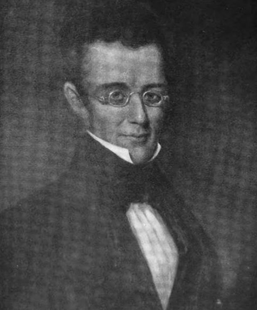 Osgood Johnson Jr. (1803-1837)
Osgood Johnson Jr. (1803-1837) In "Conviction [Part I, October 21]," I posted about Sherlock Bristol, the student who in 1834 expressed his anti-slavery views at Phillips Academy and was expelled. Claude M. Fuess, in his history of P.A., An Old New England School, is dismissive of Bristol, calling him "somewhat excitable and pugnacious in temperament." Dr. Fuess recounted Bristol's activism this way: "[A]t one of the Wednesday afternoon speaking contests, [he] delivered an inflammatory harangue against slavery. The effect of his oratory was sensational and the act could not, of course, be ignored. At the chapel exercises the following morning, with all the students and teachers present, [headmaster Osgood] Johnson arose to condemn in solemn fashion Bristol's alleged insubordination... Johnson finished by dismissing him from Phillips Academy" and refusing to let him defend himself. Bristol afterwards entered Oberlin College, and ended his days in comparative obscurity as pastor of a small church in southern California." (pp. 226-7)
Yet Bristol's act lit a fire, and, to Fuess's credit, he seems to have been retrospectively impressed by it. A few days after his expulsion, Fuess writes, Bristol's fellow anti-slavery supporters presented a petition to Johnson, asking him to sanction their newly formed abolitionist society. When he refused, they convened anyway, asking him now for an "honorable dismission" from the school. When Johnson equivocated, some forty or more of them submitted resignations. (p. 228)
Fuess reports that "only two or three ever reentered the school; the others, who were practically graduates, readily found their way into various colleges." More significant, three decades later, several of them, despite being in their late forties, actually fought in the Civil War -- "of which," Fuess notes, "their own 'little' rebellion' was merely a prelude." (p. 228) Now that's conviction.
As for Osgood Johnson Jr., who was thirty when he became headmaster and thirty-one when the "little" rebellion took place, he died at age thirty-four.
Yet Bristol's act lit a fire, and, to Fuess's credit, he seems to have been retrospectively impressed by it. A few days after his expulsion, Fuess writes, Bristol's fellow anti-slavery supporters presented a petition to Johnson, asking him to sanction their newly formed abolitionist society. When he refused, they convened anyway, asking him now for an "honorable dismission" from the school. When Johnson equivocated, some forty or more of them submitted resignations. (p. 228)
Fuess reports that "only two or three ever reentered the school; the others, who were practically graduates, readily found their way into various colleges." More significant, three decades later, several of them, despite being in their late forties, actually fought in the Civil War -- "of which," Fuess notes, "their own 'little' rebellion' was merely a prelude." (p. 228) Now that's conviction.
As for Osgood Johnson Jr., who was thirty when he became headmaster and thirty-one when the "little" rebellion took place, he died at age thirty-four.
 RSS Feed
RSS Feed
